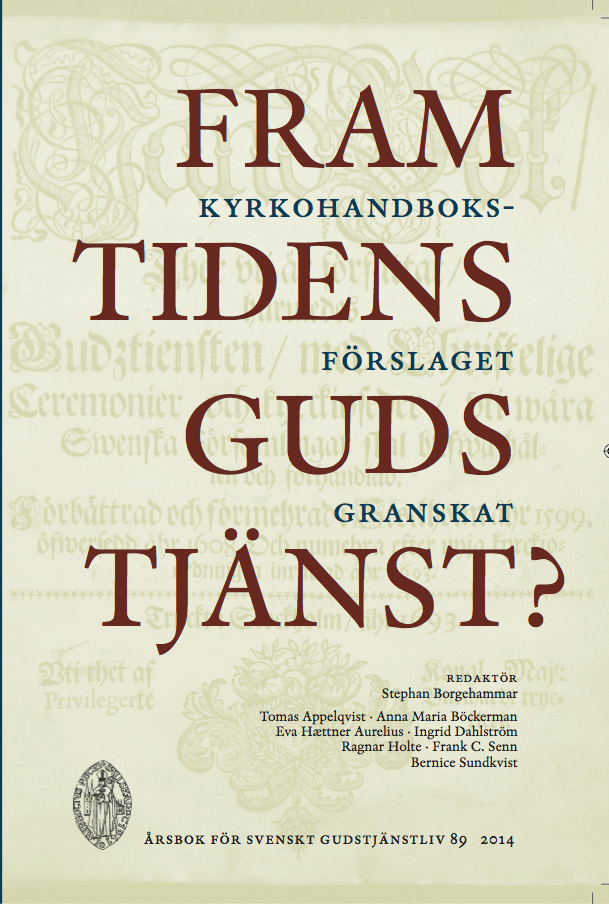Gudomlig närvaro och andlig himmelsfärd Kritisk granskning av förslag 2012 till högmässoritual för Svenska kyrkan
Abstract
Divine Presence and Spiritual Ascent Critical Evaluation of the Proposed Eucharistic Ritual for the Church of Sweden
Although the Lutheran church in Sweden is no longer in establishment with the Swedish state, it has kept its name “Svenska kyrkan” – the Church of Sweden. In its liturgy, it has preserved more of its inheritance from the early and medieval church than most other Lutheran churches, but in the twentieth century the liturgical differences between denominations have decreased under inspiration of the interconfessional liturgical renewal that has developed in connection with the Second Vatican Council. The surges from those currents are, however, less noticeable in this 2012 proposal for a reformed “Högmässa” or solemn Eucharistic service (literally “High Mass”) than is the concern to give the service a more domestic stamp, with new texts and melodies.
Most of the traditional material is kept, but without the necessary linguistic updating of the texts and without improved adjustment of text to melody. As an expert on Gregorian chant I have felt it incumbent on me to give several songs in that tradition a revised form. My main academic competence is, however, in systematic theology.
An important liturgical law seems to have been forgotten in this proposal: the fundamental difference between ritual elements of two contrasting kinds:
Divine presence in the community
Christ is here among us
Lord, have mercy on us
Open your hearts to God –
and listen to this day’s gospel
The body of Christ, given for you
The peace of our Lord be with you
Spiritual ascent in prayer and song of praise
Our Father in heaven
Glory to God in the highest
Lift up your hearts to God –
our hearts are lifted up in praise
Heaven and earth are full of your glory
God, we thank you. God, we praise you
Lines 1–2 and 5–6 here above are in accordance with the proposal; the problem lies in lines 3–4. An earlier committee whose proposal was not accepted had criticized the classical formulation “Lift up your hearts to God” as suspect from a feminist point of view, not seeing that it is an appeal of the same kind as 1 and 2 which they had accepted. They had instead proposed the formulation “Open your hearts to God”, not realizing that it is an expression of the contrasting, receiving perspective, which is totally inadequate at the moment when the congregation is to rise up for a standing ovation to God. The present committee has remarkably enough suggested a free choice between the “Lift up” and “Open” appeals, not only here but also as prelude to the recitation of the Gospel of the day – where of course the ”Open” appeal is the appropriate one. A new formulation is presented above, namely “Our hearts are lifted up in praise”. This, I suggest, could fittingly replace the present rather vacuous formulation “We lift up our hearts”.
I have expressed a high valuation of most of the prayers in the proposal, the new ones as well as those preserved or revised. But a serious problem left unsolved concerns the recommendation to abandon subjunctive verbal forms. A prayer to Christ after the communion that he preserve the communicants unto eternal life has been distorted by being formulated in the indicative instead of the subjunctive, so that it becomes an assurance that Christ will preserve them to eternal life. Both versions are accepted in the proposal despite the fact that the indicative one is obviously in conflict with the Biblical message. A similar problem with the concluding Aronitic Blessing is left equally unsolved.
Downloads
Publicerad
Nummer
Sektion
Licens
© författarna, Laurentius Petri Sällskapet för svenskt gudstjänstliv samt Artos & Norma bokförlag. Det är tillåtet att kopiera och använda material ur Svenskt Gudstjänstliv för forskningsändamål om källan anges. För övriga ändamål kontakta respektive artikelförfattare samt förlaget. Särskilda restriktioner kan gälla för bildmaterial.


